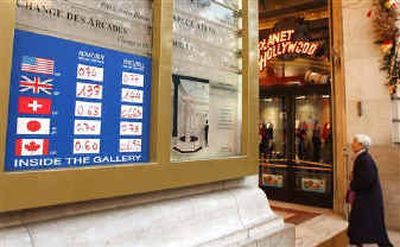Dollar continues to slide

BERLIN – The U.S. dollar dropped to a new all-time low Tuesday against the euro, which rose to $1.3335 even as new figures showed that U.S. economic growth in the third quarter was stronger than previously estimated.
The dollar’s persistent slide has been fueled by concern over the U.S. trade and budget deficits, and analysts say markets are paying only limited attention to other economic data against that background.
The dollar hit its new low against the euro, whose previous record of $1.3329 was set Friday, shortly after European Central Bank President Jean-Claude Trichet renewed his assertion that the euro’s rapid rise against the U.S. currency is “unwelcome.”
Because the euro’s rise tends to make European products more expensive, European leaders have voiced fears that it might hurt the continent’s export-driven economic recovery.
The weak dollar also makes life tougher for Americans living abroad, and the U.S. military announced this week that troops stationed in Europe would receive a significant cost of living increase to help provide some relief.
Still, Trichet’s comments in testimony to the European Parliament — which echoed his previous remarks — didn’t appear to advance the chances of the ECB wading into currency markets to reverse the tide, said Lee Ferridge, chief currency strategist at Rabobank in London.
“It doesn’t seem to be top of the agenda at the moment,” he said, adding that “the trend is still intact” and the euro could top $1.35 in the next two weeks.
Asked about the possibility of cooperation between the euro zone and the United States to strengthen the dollar, Trichet said only that he appreciated Washington’s oft-stated “strong dollar” policy.
“I have confidence in the capacity of the friends on the other side of the Atlantic … to deliver over time the substantial reduction of the fiscal deficit,” Trichet said.